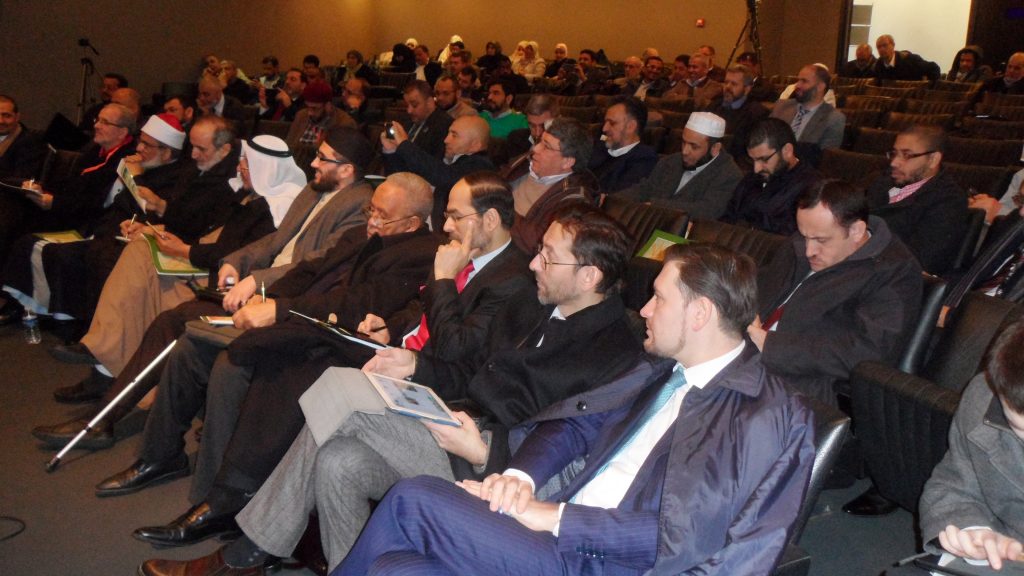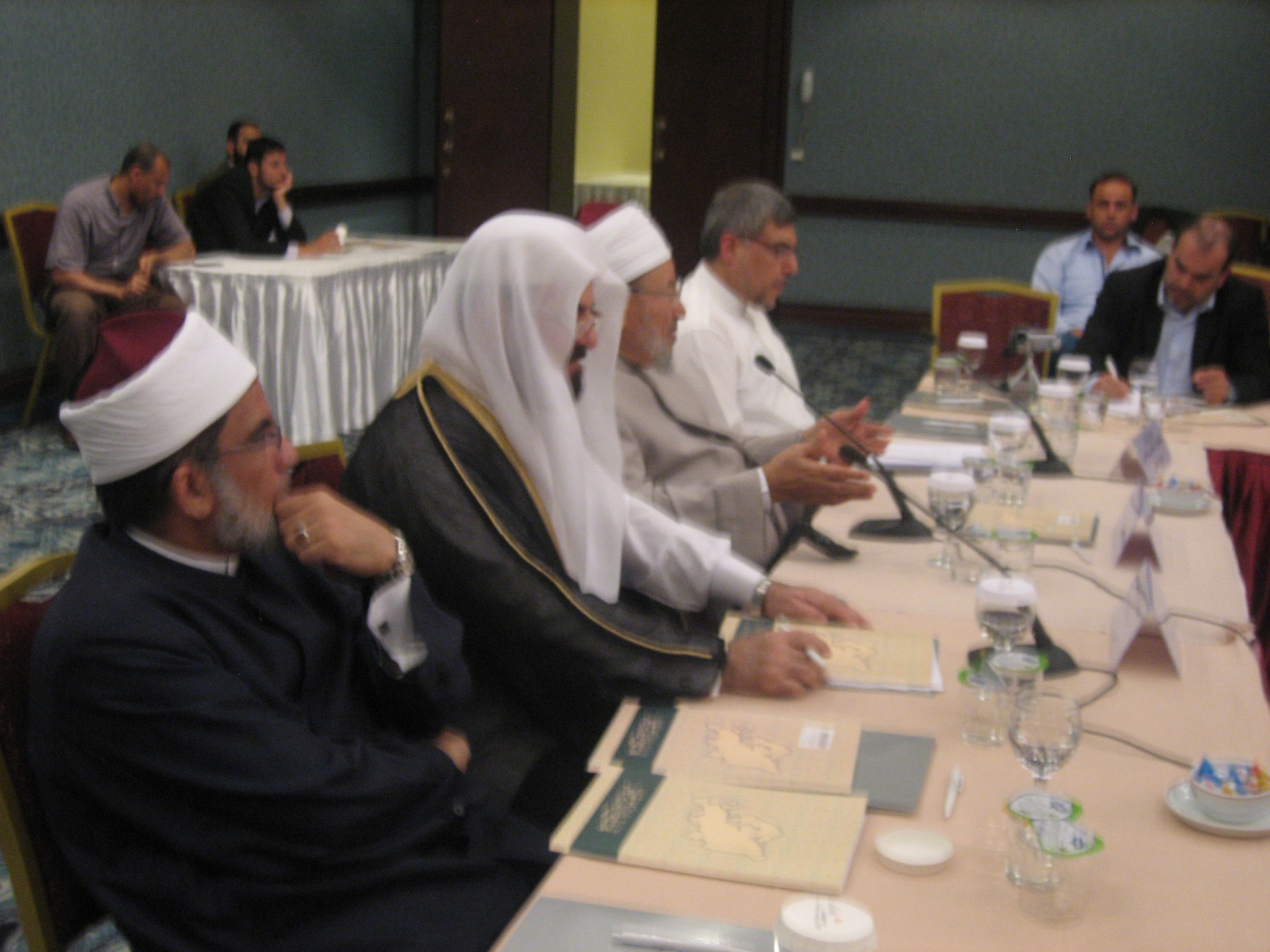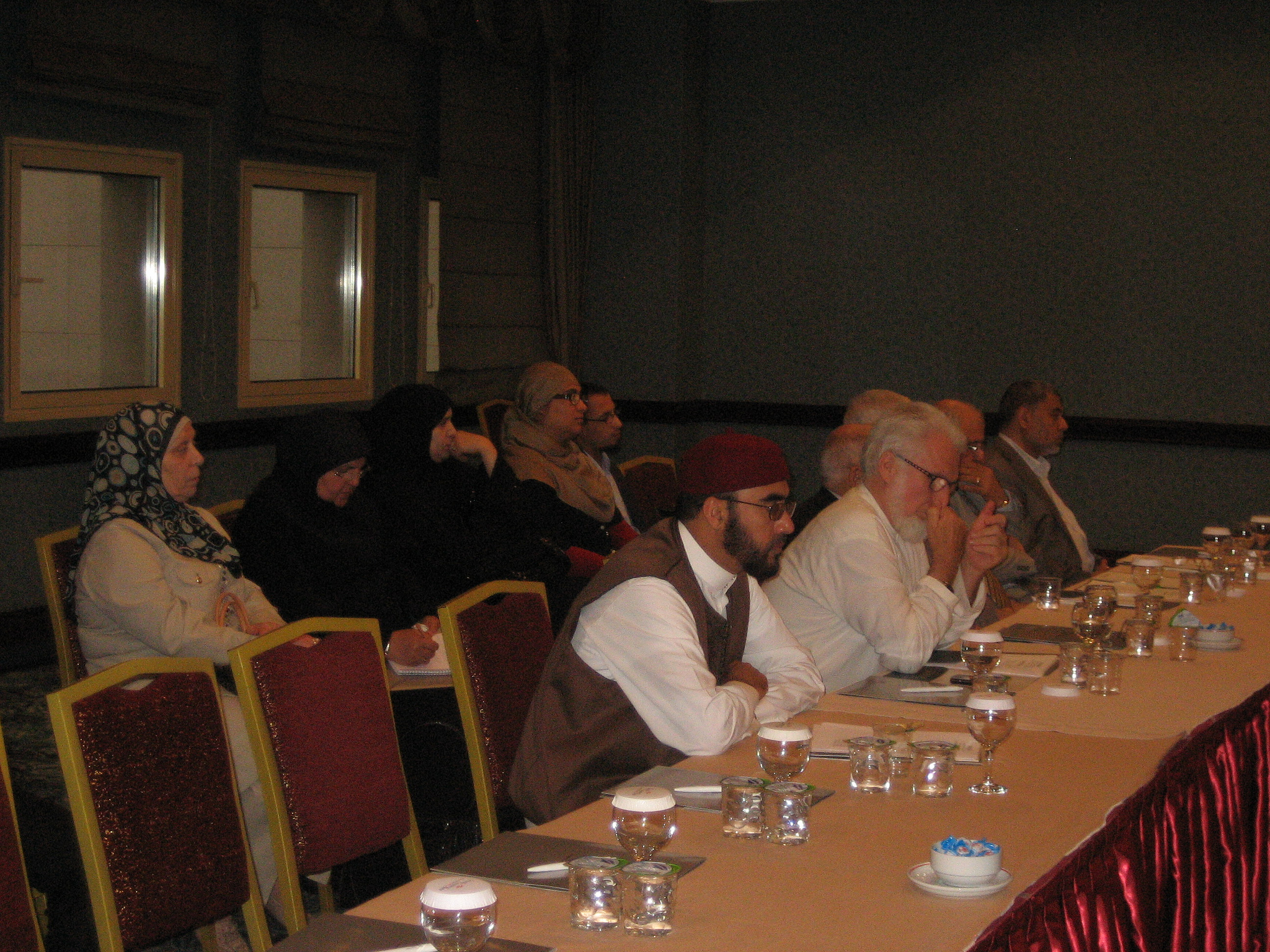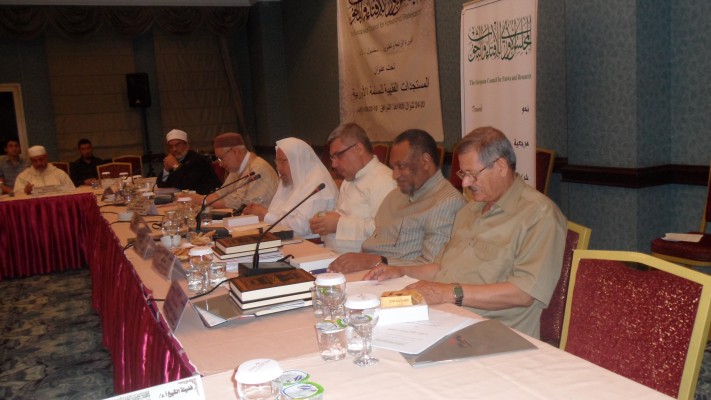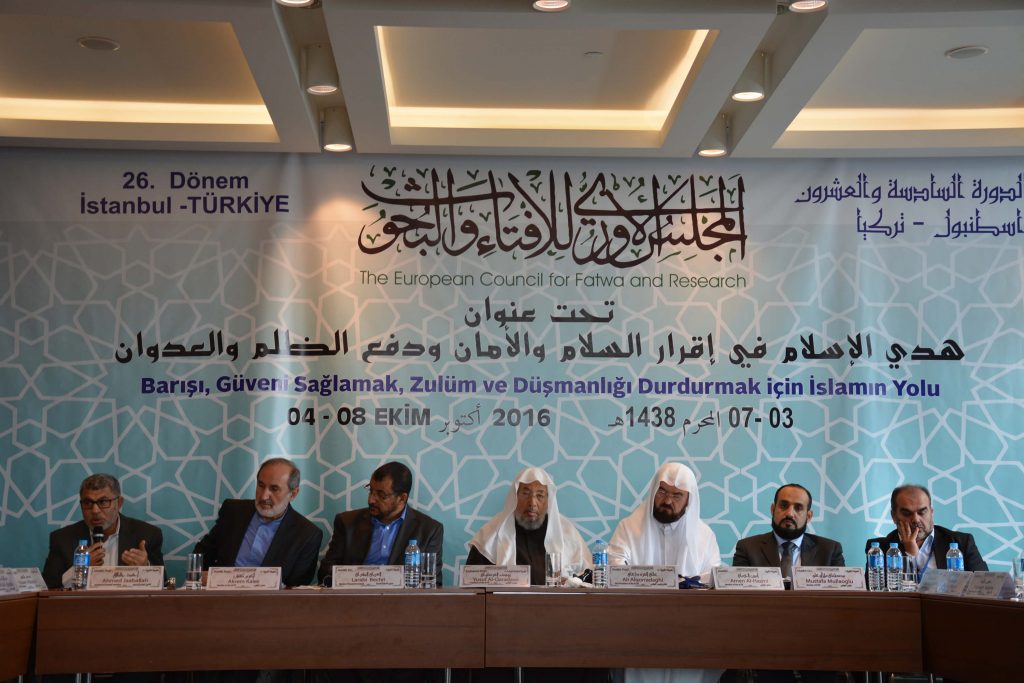The sixteenth Ordinary Session of The European Council for Fatwa and Research
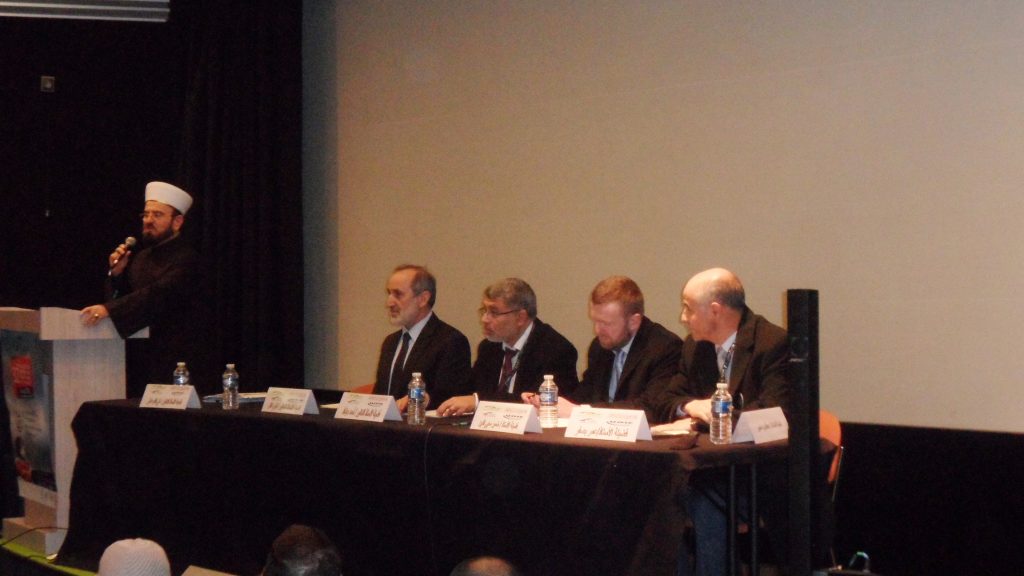
European Council for Fatwa and Research
Final Statement
The sixteenth Ordinary Session of
The European Council for Fatwa and Research
Held in Istanbul, Turkey
During the period
07-13 of Jumada Al-Akhirah, 1427 AH
03 – 09 of July, 2006
Translated Bu Ali Selim
In the Name of Allah, Most Gracious, Most Merciful
The final Statement of the Sixteenth Ordinary Session of the European Council for Fatwa and Research held in Istanbul, Turkey during the period from 07-13 of Jumada Al-Akhirah, 1427 AH corresponding to 03 – 09 of July, 2006
Praise be to Allah, the Worlds’ Sustainer, and peace be upon our leader Muhammad and on all his family and his Companions and those who follow his guidance until the Day of Judgment.
By Allah’s Grace and His Assistance the Sixteenth Ordinary Session of the European Council for Fatwa and Research (ECFR) was held in Istanbul, Turkey, during the period 07-13 of Jumada Al-Akhirah, 1427 AH corresponding to 03 – 09 of July, 2006, chaired by His Eminence Sheikh Yusuf al-Qaradawi, and attended by most of the Members of the ECFR and a number of guests and observers.
The opening meeting, attended by almost a thousand of a wide range of Turkish scholars, officials and members of Turkish society, was commenced with a speech delivered by High Court Judge, Sheikh Faysal Maulawi, Deputy Chairman of the ECFR in which he illustrated the history of the ECFR and its role in providing Islamically legal moderate solutions to solve the problems confronting Muslims in Western societies. This was successively followed by a speech delivered by His Eminence Dr. Sheikh Qaradawi, Chairman of the ECFR in which he crystallized the fundamental message of the ECFR and its methodology of moderation, which is a Qur’anic and a prophetic way, when issuing fatwas. Dr. Qaradawi also showed, throughout its fifteen sessions, how eager the ECFR has been to exhort Muslims living in Europe to achieve positive integration and coexistence based not on assimilation but rather the fundamental principles of Islam while, with regard to otherwise, portraying flexibility. Moreover, His Eminence Dr. Sheikh Qaradawi addressed current tragedies, i.e. murdering civilians of women, children, etc, perpetrated by Zionists on the land of Palestine within sight and hearing of the entire world. Dr. Qaradawi stressed that condemnation of this oppression and transgression is a duty.
Then the ECFR resumed its programme commencing with a seminar on the political Fiqh for Muslims living in Europe during which the discussion evolved around the following:
First: Religion and politics and Islamic and European perception:
The following researches were submitted and deliberated:
- “Religion and politics according to Islamic sources and repudiating arguments” by Dr. Sheikh Yusuf Al-Qaradawi
- “Politics and religion in the light of principles and history” by Dr. Sa’id Harib
- “The place of religion in European political systems” by Dr. Joen Brubere
- “Politics and religion under the shade of secularism in Europe” by Dr. Rafiq Abdu-l-Salam
Second: Reviewing certain aspects of the Islamic political Fiqh
The following researches were submitted and deliberated:
- “General evaluation for the Islamic political Fiqh” by Dr. Salah Arqad
- “Reviewing certain aspects of the Islamic political Fiqh” by Dr. Adbus-sa-ttar Abu Ghidah
- “Renewing the Fiqh of legal Islamic politics” by Dr. Abdu-l-Majeed An-Najar
- “The Shura[1] in the light of Islamic fundamentalism and the reality” by Dr. Ahmad Al-Imam
- “Pluralism in the Islamic political Fiqh” Sheikh Rashid Al-Ghannushi
- “Non-Muslim political participation in Muslim society (Judgeship)” by Dr. Isam Al-Basheer
- “Caliphate or democracy” by Dr. Suhaib Hassan
- “Shura and democracy, commonalities and discrepancies” By Sheikh Hussein Halawa
Third: Muslims and politics in Europe
The following researches were submitted and deliberated:
- “Islamic legal establishment for the political contribution of Muslim minorities in Europe” by Sheikh Faysal Maulawi
- “Future dimensions for the political contribution of Muslim minorities in Europe ” By Mr. Ahmad Ramadan
- “Considerations for particular change in the administration of the Islamic project in Europe” By Dr. Khalid Mahmoud
Fourth: The political contribution of Muslim minorities in Europe
The following researches were submitted and deliberated:
- “The Islamic sources of the political Fiqh for Muslim minorities in Europe” by Dr. Nadia Mahmoud Mustafa
- “The Muslim political contribution in Turkey in the light of Islamic principles and secularism” by Dr. Yaseen Aktai
- “The Muslim political contribution in Europe in European perception” By Dr. Olivier Roi
Fifth: The Islamic legal and moral criteria for the political contribution of Muslim minorities
The following researches were submitted and deliberated:
- “The Islamic legal principles and rules that pinpoint the Muslim political contribution in Europe” by Dr. Ali Al-Quradaghy
- “The criteria of the contribution of Muslim minorities in the West in the process of election” by Salah Sultan
- “The political contribution of Muslim minorities in Europe in the light of Islamic legal criteria and secularism” by Ahmad Jaballah
Sixth: Islamic Judicial establishment for Muslim political contribution in Europe
The following researches were submitted and deliberated:
- “The European Muslims’ political fidelity in the light of their religious obligations and national duties” by Sheikh Abdullah Ben Baiyah
- “Dividing the Muslim role in a Fiqh perception and its influence on reality” by Sheikh Abdullah Al-Judia’
- “The moral principles of Muslim political contribution in Europe” by Sheikh Mustafa Ughlu
- “Muslims in Europe and the support of Muslim issues, rules and criteria” by Sheikh Salem Al-Sheikhy
Upon submitting and deliberating on the aforementioned researches, intellectual concepts thereof have been formed some of which are:
First: Politics, in the Islamic perception, means to accomplish people’s worldly and otherworldly affairs at both individual and congregational levels in conformity with Islamic legal rules formed on a textual basis or Ijtihad[2].
Second: Politics is a part of Islam that overwhelms all creedal, moral, methodological and legal aspects of this life in terms of worship and international, constitutional, administrative, judicial, social and educational dealings. Prophet Muhammad – peace be upon him- represented an amalgamation of worldly and religious authority. In fact his message is a comprehensive project for societal reformation that accomplishes worshiping Allah and attaining prosperity on earth. Hence, Muslims all over the world believe that there is an amalgamation between religion and politics resulting from the comprehensiveness of Islam the rules of which can never be divided.
Third: From the Islamic perspective, the essence of democracy is a confirmation of Shura while holding fast to the Islamic fixed rules in a way that leads to the stability of the Islamic political system, equality and equity among all citizens and supervising the state work.
Fourth: From the Islamic perception, politics is a collective duty. Nevertheless, sometimes it could be an individual duty as it is included in the divine command of the prevalence of good and the preaching thereof and confronting what causes harm to society which is established on the fundamental principles.
Upon deliberating on the above mentioned researches in the seminar, the ECFR has issued the following resolutions:
Resolution 1/16
Muslims are citizens and residents in Europe
Based on the outcome of the researches that elaborated on classifying the world into Dar-ul-Islam (Muslim world), Dar-ul-Harb (zone of war) and Dar-ul-‘Ahd (zone of treaty), the ECFR reached the following resolution:
First: Classifying the world into Dar-ul-Islam (Muslim world), Dar-ul-Harb (zone of war) and Dar-ul-‘Ahd (zone of treaty) dates back to the early time of Islam. In addition, it was formed in the context of war which is an exceptional case since Islam states that originally the relations between Muslims and non-Muslims are based on peaceful coexistence.
Second: Collecting all the results of this classification and the rules based thereupon in the Islamic Fiqh was condoned in conformity to the context of the circumstances of the Muslim state and the rest of the world at that time.
Third: The current reality is that nowadays Muslims live in European countries of religious, cultural and ethnic pluralism based on peace that achieves security and guarantees mutual rights. In this regard Muslims are divided into:
First: Citizens whose entire rights of citizenship are guaranteed by law e.g. freedom of belief and explaining it to others. Those citizens are obliged to fulfill all the requirements of citizenship i.e. abiding by law. Allah said: ” O you who believe! Fulfill (your) obligations.(5:1)
Second: Residents: They can only be granted a resident visa upon being issued with an entry visa considered as a declaration and a contract that obligate abiding by the laws of the state by the virtue of the Qur’anic command with regard to fulfilling the covenant. Allah said: “And fulfil (every) covenant. Verily! the covenant, will be questioned about.(17:34)
Fourth: All Muslims should abide by Muslim morals including the rules of Halal[3] and Haram[4] whether they live in Muslim countries or otherwise.
Resolution 2/16
The European Muslim fidelity
Upon deliberating on the researches elaborated on the issue of fidelity and its impact on Muslim citizens and Muslim immigrants living in Europe, the ECFR reached the following resolution:
Fidelity is a solemn covenant that creates a very warm relationship resulting in requirements, rights and obligations. This relationship is of different types and various dimensions. Fidelity could be for religion, lineage and people or it could be because of covenant and contract. All these types of fidelity are stated in the Qur’an and Sunnah.
The peak of these types is the fidelity for creed that encompasses faith and its articles and the practice of rituals based thereupon and adhering to the subtle morals. This type of fidelity does not contradict fidelity for the country that man owes by virtue of citizenship contract, so man should defend it against any transgression.
Resolution 3/16
The Islamic rule regarding Muslim residence in non-Muslim countries
Upon deliberating on a number of researches elaborating on the Islamic rule regarding Muslim residence in non-Muslim countries, the ECFR stressed a previously issued fatwa in this regard adding:
First: When the Muslim enjoys security with regard to himself and his religion in a certain area where his rights, to practice his religion without causing any harm, are guaranteed, the Islamic rule of his residence therein is of three types:
First: Permissible: If his residence in this non-Muslim area equals his residence in a Muslim area.
Second: Recommended: If his residence in this non-Muslim area enables him, more than elsewhere, to positively integrate into the society to which he is related and introduce the good aspects of his religion, subtle morals and good values.
Third: Obligatory: If his leave would cause guaranteed harm or corruption while he is able to prevent it.
Second: Migration is not an Islamic legal requirement unless the Muslim has concerns with regard to his religion and he has been persecuted as a result of the practice thereof and he has been harmed in himself, his wealth or his family therefore.
Resolution 4/16
The harmony of adhering to the Islamic fixed rules and the requirement of citizenship
The ECFR deliberated on resolution No. 155 (4/17) issued by the International Council of the Islamic Fiqh emanating from the Organization of the Islamic Conference in the 17th session. Following is part of that resolution stressed by the ECFR:
“Citizenship means belonging to a certain country in terms of its land and reality and holding its citizenship. In Islam fixed rules mean legal rules with regard to creed, practice and morals stated by authentic one-interpretation texts or agreed upon consensually by the Muslim ‘Ummah, which includes preserving the five essentials i.e. religion, soul, mind, procreation and ownership” and the legality of “Muslim contribution, in non-Muslim countries, to the social, political and economic activities that does not contradict the aforementioned Islamic fixed rules especially when this contribution becomes a requirement of citizenship provided it does not threaten their Muslim identity.” “And that it should not be resorted to the methodology of exemption with regard to Muslims living in non-Muslim countries unless the requirements thereof are fulfilled or there is a need for it while keeping the level of exemption matching the level of the situation.
Resolution 5/16
The political contribution, its rules and criteria
Upon deliberating on the researches submitted in this regard, the ECFR reached the following resolution:
First: The target of the political contribution is to preserve rights and freedom and to defend moral and spiritual values and Muslim existence in such a country and their legal interests.
Second: Originally it is permissible for Muslims living in Europe to take part in politics. Nevertheless, sometimes it can be permissible or recommended or prohibited. This is the meaning of the Qur’anic command, Allah said: “Help you one another in Al-Birr and At-Taqwa (virtue, righteousness and piety); but do not help one another in sin and transgression.(5:2)
Third: Political contribution includes taking part in civic society, joining parties, forming trends and taking part in the process of voting either by voting or running elections.
Fourth: Adhering to Muslim morals, e.g. truthfulness, justice, honesty, respecting diversity and contradicting opinions, clean competitions and shunning violence, is one of the foremost criteria of Muslim participation in politics.
Fifth: One of the foremost criteria of Muslim participation in politics with regard to voting is to hold fast to Islamic, legal and moral rules e.g. pure intention to accomplish projects of public interest, shunning cheating and defamation and purity of all personal interests.
Sixth: It is permissible to spend money on electoral campaigns even though the candidate might not be a Muslim provided he is more capable of accomplishing issues of public interest.
Seventh: The permissibility of Muslim political participation applies to both man and woman.
Resolution 6/16
Supporting the fair issues of the oppressed
First: Support means to help the oppressed to take their rights and to help them to save themselves from oppression via applying legally permitted methods and to exhaust every possible legal means to save them.
Second: The Muslim is obliged to support his Muslim brother. It is a collective duty if others can do it otherwise it becomes an individual duty provided he can do it.
Third: Originally all means of support to attain legal objectives whether financial, political or media objectives are permissible provided:
First: The means should be permissible
Second: Applying it should not cause any corruption. Hence means cannot be used when it involves transgressing on lives and wealth of innocents.
Third: It should not be observed while neglecting more important duties
Third: Originally all means of support to attain legal objectives whether financial, political or media objectives are permissible provided that the following conditions are observed:
- The means should be permissible
- Applying the means should not cause any corruption. Hence means cannot be used when it involves transgressing on the lives and the wealth of innocents;
- These means should not be observed while neglecting more important duties
Fatwas
1/16
Transaction
Question:
I have commercial relations with a promising European company whose business is purchasing ready-made women’s clothes. It is owned by two European people and I represent the company in the Middle East. I promote its products by creating markets in the Arab markets. The company has offered to sell me 25% of the company. It is such a great opportunity as the company has extensive experience in this field in addition to the good quality of its products sold at competitive prices. Taking into consideration the fact that my partners in Europe have got their money through various sources e.g. bank loans but through legal ways as they have good reputations in the country where they live, is it permissible to purchase 25% of this company? In case I become a partner in this company, the company has good relations with banks that provide the company with services e.g. cash, is this permissible taking into consideration the fact that the company’s business is to design and manufacture ladies’ clothes? Please note that this company applies a system of franchises i.e.:
1- To use the company’s name in return for a certain fee
2- To submit a bank guarantee with half of the value of the commodity
3- To apply certain specifications and experience
4- To rent a suitable area as requested by the company
The company provides the agent with commodities as long as his fare is held in return for a certain percentage of the profits. In case some commodities are not sold they can be returned to the company which replaces them with other commodities. Nevertheless, as I have good relations with this company I managed to amend some conditions stipulating an increase of fees on overdue amounts. Moreover through my relation with the company I managed to change the impression of Islam that the owners and the staff members of the company had. We pray to Allah to make a good start with them.
Answer:
First: There is no harm in purchasing shares in commercial companies i.e. the company of issue even if the sources of the owners’ money are different as some are halal and others are bank loans that incur interest. The responsibility of taking a prohibited loan is shouldered by whomever accepts it provided the place of partnership is not provided as a guarantee as in this case the partners become guarantor to the prohibited loan, the writing and witness thereof are forbidden, let alone its guarantee.
Second: The Muslim partner should have the right of administration or have the transactions under his control so that they can be in conformity with Islamic law e.g. bank loans, selling by installments etc
Third: Running the business on the basis of franchises is permissible as it is perceived as renting an abstract right and the International Islamic Fiqh Academy issued a resolution stating the permissibility of purchasing and renting abstract rights. It should be noted that utilizing the tools and mechanism and methods of the company granting the right of franchises is to be observed to preserve the quality of the company product. In addition, buying the raw materials from the company should also be observed for the same reason as a fulfillment to the agreement.
Fourth: That the partner endeavours to correct the stipulations of transactions by canceling the interest posed on overdue amounts is an act of forbidding evil that the Qur’an commands us to observe.
Fatwas
2/16
Marriage in ‘Iddah[5]
Question:
A mother of children argued with her husband, so he divorced her three times verbally separately while he was fully conscious. After the third divorce, but before the expiry of her ‘Iddah, she got married to another man via the traditional marriage. This marriage was also terminated after sometime. For the sake of her children she contacted her first husband and they both agreed to get married again. Can they marry and how to do it?
Answer:
Allah said: “The divorce is twice, after that, either you retain her on reasonable terms or release her with kindness. And it is not lawful for you (men) to take back (from your wives) any of your Mahr (bridal-money given by the husband to his wife at the time of marriage) which you have given them, except when both parties fear that they would be unable to keep the limits ordained by Allâh (e.g. to deal with each other on a fair basis). Then if you fear that they would not be able to keep the limits ordained by Allâh, then there is no sin on either of them if she gives back (the Mahr or a part of it) for her Al-Khul’ (divorce). These are the limits ordained by Allâh, so do not transgress them. And whoever transgresses the limits ordained by Allâh, then such are the Zâlimûn (wrong-doers). And if he has divorced her (the third time), then she is not lawful unto him thereafter until she has married another husband. Then, if the other husband divorces her, it is no sin on both of them that they reunite, provided they feel that they can keep the limits ordained by Allâh. These are the limits of Allâh, which He makes plain for the people who have knowledge.(2:229-230)
A marriage that takes place while the woman’s ‘Iddah is not expired is null and void even if she is not divorced three times. This woman and the man who married her before the expiry of her ‘Iddah should seek Allah’s forgiveness and repent to Him. That could have happened out of ignorance. So, the Imams should educate Muslims on Fiqh of family affairs as they do on Fiqh of worship through the Fridays’ sermons and through lectures.
This woman cannot remarry her first husband who divorced her thee times unless she marries another man with pure intention of marriage provided intercourse occurs and then she gets divorced or her husband pass away and her ‘Iddah expires.
Fatwas
1/16
Women’s right in attending mosque
Question:
We, the Cultural Arab association in Argus, Denmark, have a small mosque. The month of Ramadan, during which the young and the old men and women frequent the mosque, will commence soon. As a result of this situation we resorted to pitching tents and hiring WC facilities for women to encourage them to come to the mosque. Some brothers protested, arguing that we should not burden ourselves with this responsibility as women are not commanded to pray in the mosque and their prayer at home is better.
Answer:
The association should facilitate a place for women as long as this is attainable since they have the right to attend the congregational prayers and the Fridays’ prayers and the Taraweeh prayers[6]. They also have the right to take part in the lectures delivered at the mosque. That is for the following reasons:
First: The prophet – peace be upon him – said: “Prevent not Allah’s female servants from attending the mosque” Agreed upon. This hadith proves women’s right to share the mosque with men. Moreover, originally the Islamic obligations usually apply for both men and women unless one sex is exempted due to its nature.
Second: During the lifetime of the prophet – peace be upon him – and during the era of the Muslim guided Caliphs women used to go to mosques and perform the congregational prayers and the Fridays’ prayers and attend other activities.
Third: The need of women living in Europe for a spiritual and educational provision and to have their positive role in the Muslim community. This can be achieved in no place other than the mosque and the month of Ramadan is a great opportunity for that.
Fatwas
4/16
Question:
We live in a Western country and I have noticed that it is common in this country that shortly after slaughtering the animal on Eid-ul-Adha the slaughterers, even though sometimes they are Muslims, cut the spinal cord so that the animal may not give them a hard time after slaughtering. There is no doubt that cutting the spinal cord entirely paralyzes the animal, in spite of the fact that the animal’s movements after slaughtering allow the maximum amount of blood to come out.
Answer:
If the Islamic requirements are observed when slaughtering, there will be no harm to pierce the animal or cut the spinal cord to weaken or stop its movement.
The coming out of blood has nothing to do with the spinal cord. It is entirely dependent on the heart pulses that continue after slaughtering. This is a special characteristic of the heart on the basis of which the heart of a dead man could be transplanted in a live one.
Fatwas
5/16
Earnings
Question:
My sister requested that I would teach women in return for a certain amount of money paid to her and that she would give me a small amount thereof (100Euros). Taking into consideration the fact that the state pays me social welfare; can I do this without informing the state since the state does not recognize teaching Arabic and will not accept it as a job? Does it make a difference if I spend the 100Euros on charity?
Answer:
First: As far as we know there is no European country that does not allow teaching foreign languages including Arabic. The opposite is true – learning foreign languages is encouraged. In the light of globalization, no country can do without that.
Second: There is no harm in teaching Arabic. However, if you earn money you will have to inform the state. Moreover, it is not allowed to fill in the unemployment application if you can find a job even though you could earn very little. Sincerity should be observed when dealing with any system in all issues including the financial issue. The ECFR always recommends Muslims to observe sincerity and transparency and confirms the prohibition of lying when filling in the unemployment application.
But if the money you earn is so little that the state permits you to earn, then you are entitled to take it.
Third: If it is true that you want to spend this money on charity, do you not do the job voluntarily and request your employer to spend this money on the specific charity you would have spent it on had you taken it. Both legally and Islamically this is better for you.
The ECFR concluded the sixteenth session with the following recommendations:
- That Muslims in Europe should endeavour to establish research centers specialized in the political Fiqh.
- That Muslims in Europe should endeavour to coexist and positively integrate into European societies in such a way that does not lead to isolation or assimilation but an integration through which all members of society work together for a mutual future in which all interests can be attained while respecting all religions and cultures.
- That Muslims in every European or Western country should adopt a political project while observing all the legal criteria that targets the interest of all societies to establish the worship of Allah and to attain prosperity on the earth.
- That the Imams and the leaders of Muslim organizations should urge Muslims to participate in elections occurring in the European arena and register their names and interact with the local and general elections.
- That Muslims living in Europe should advise each other and consult with each other with regard to evaluating the candidates and recommend voting for the best so that the best unity can be attained and the Islamic command of Shura can be embodied.
- That brilliant students should be exhorted to study law and political science so that Muslims can have professional representatives.
The ECFR confirms its usual recommendations to Muslims living in Europe as follows:
- Observe all rights and reflect a good image and a benevolent example through their words and deeds.
- Be creative and inventive and encourage that on all levels.
- Do their best to bring up the new Muslim generation – boys and girls- in a contemporary Muslim way via opening schools and educational and recreational centers to protect them against deviation.
- Work hard to establish firms and financial institutions that do not get involved in illegal transactions.
- Work hard to form legal (Shari’a) committees to regulate their family affairs according to the shari’a and in conformity with the laws of the country where they live.
- Work hard to attain the recognition of the state where they live of Islam as a religion and of Muslims as a religious minority, like other minorities in respect of enjoying their complete rights and organizing their personal affairs, such as marriage and divorce according to the tenets of their religion.
- Commit themselves to what is stated in the Holy Qur’an and Sunnah and what Muslim Fuqaha’ (jurists) have unanimously agreed upon regarding the obligation of keeping the requirements of the pledge of security and the terms of citizenship and residence in the countries where they live.
- The Council also recommends that Muslims in general, and those dwelling in the West in particular, adhere to Allah’s religion and brotherhood, tolerance, moderation, cooperation in matters of benevolence and righteousness. They should also adopt quiet dialogue and sound methods to solve controversial problems away from the programmes of strictness and paths of extremism that would distort the image of Islam and badly harm Muslims in general, and Muslim minorities in particular. The enemies of Islam and those ignorant of it would defame it and warn others of it and its followers and instigate other nations against it. Allah Almighty says: “Invite (all) to the Way of your Lord with wisdom and beautiful preaching and argue with them in ways that are best and most gracious.” (An-Nahl 125)
On the basis of the resolutions the ECFR has reached with regard to supporting just issues and in the light of current events in Palestine in terms of the transgression of civilians and the planned destruction of their infrastructure and violating all human values by Zionists, the ECFR on behalf of Muslims living in Europe expresses its extreme concern and condemns that transgression. Taking into consideration the various attitudes of European countries and organizations that the ECFR appreciates, the ECFR hope that these European countries and organizations can be stronger in renouncing this transgression and put an end to the oppressive embargo. The ECFR urges all Muslims, free peoples and all the countries to hasten to support the Palestinian people who are politically and financially afflicted and to terminate the oppressive embargo. Allah said: “Help you one another in Al-Birr and At-Taqwa (virtue, righteousness and piety); but do not help one another in sin and transgression.(5:2)
Before concluding the proceedings of the Session a time has been made for the next session as follows and the precise date will be announced later on:
In the second half of May 2007
The Council concluded the proceedings of the 16th Session by addressing sincere thanks and appreciation for al-Maktoum Charity Committee for their continuous support and sponsorship of the Council. The Council also extends sincere thanks to the Turkish Government and Istanbul municipality and Al-Hikma Association for their efforts to facilitate this session.
Our last prayer is praise be to Allah
[1] Islamic system of consultation
[2] Reasoning
[3] Permissible
[4] Prohibited
[5] Period of waiting during which widow or divorced woman cannot marry
[6] A voluntary prayer observed by Muslim during the nights of Ramadan

